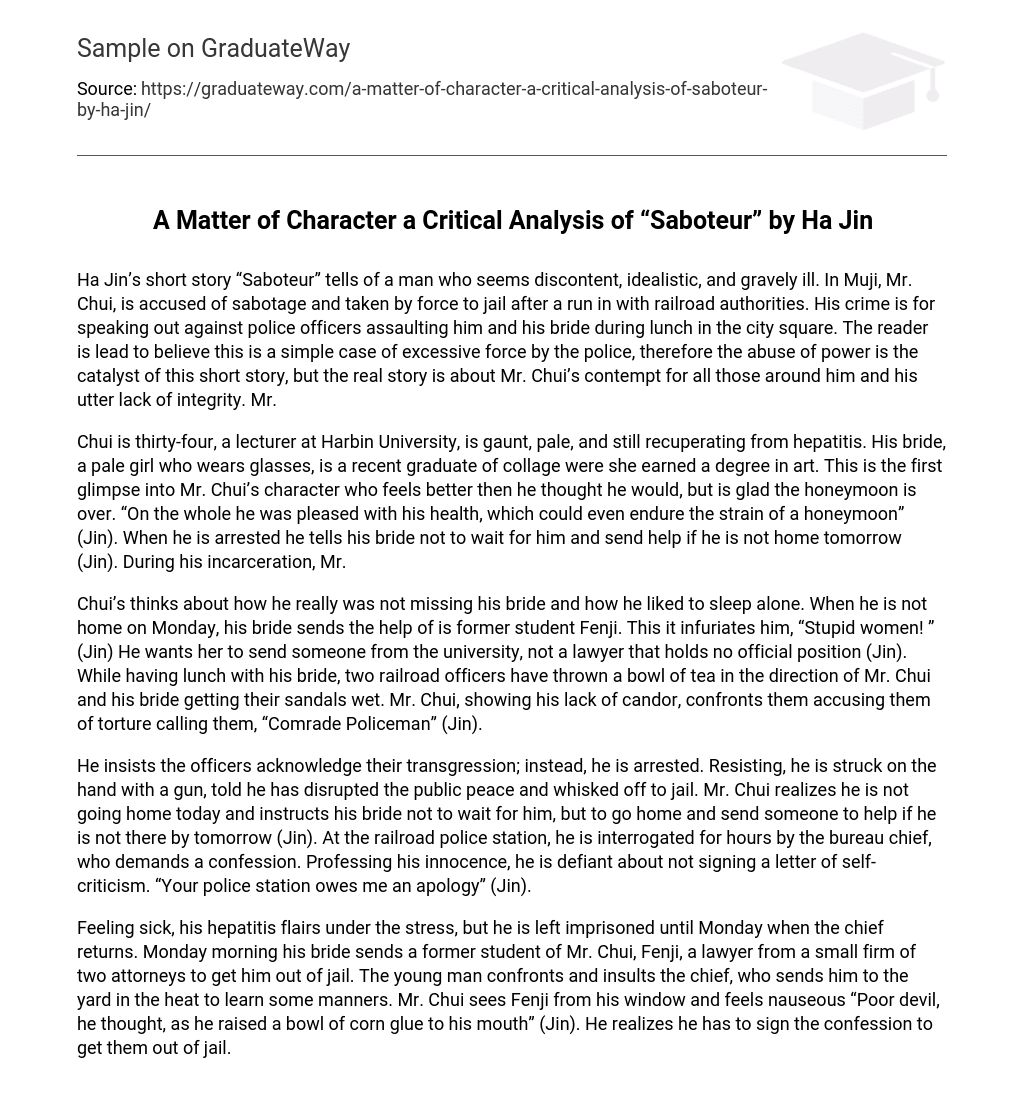Ha Jin’s short story “Saboteur” tells of a man who seems discontent, idealistic, and gravely ill. In Muji, Mr. Chui, is accused of sabotage and taken by force to jail after a run in with railroad authorities. His crime is for speaking out against police officers assaulting him and his bride during lunch in the city square. The reader is lead to believe this is a simple case of excessive force by the police, therefore the abuse of power is the catalyst of this short story, but the real story is about Mr. Chui’s contempt for all those around him and his utter lack of integrity. Mr.
Chui is thirty-four, a lecturer at Harbin University, is gaunt, pale, and still recuperating from hepatitis. His bride, a pale girl who wears glasses, is a recent graduate of collage were she earned a degree in art. This is the first glimpse into Mr. Chui’s character who feels better then he thought he would, but is glad the honeymoon is over. “On the whole he was pleased with his health, which could even endure the strain of a honeymoon” (Jin). When he is arrested he tells his bride not to wait for him and send help if he is not home tomorrow (Jin). During his incarceration, Mr.
Chui’s thinks about how he really was not missing his bride and how he liked to sleep alone. When he is not home on Monday, his bride sends the help of is former student Fenji. This it infuriates him, “Stupid women! ” (Jin) He wants her to send someone from the university, not a lawyer that holds no official position (Jin). While having lunch with his bride, two railroad officers have thrown a bowl of tea in the direction of Mr. Chui and his bride getting their sandals wet. Mr. Chui, showing his lack of candor, confronts them accusing them of torture calling them, “Comrade Policeman” (Jin).
He insists the officers acknowledge their transgression; instead, he is arrested. Resisting, he is struck on the hand with a gun, told he has disrupted the public peace and whisked off to jail. Mr. Chui realizes he is not going home today and instructs his bride not to wait for him, but to go home and send someone to help if he is not there by tomorrow (Jin). At the railroad police station, he is interrogated for hours by the bureau chief, who demands a confession. Professing his innocence, he is defiant about not signing a letter of self-criticism. “Your police station owes me an apology” (Jin).
Feeling sick, his hepatitis flairs under the stress, but he is left imprisoned until Monday when the chief returns. Monday morning his bride sends a former student of Mr. Chui, Fenji, a lawyer from a small firm of two attorneys to get him out of jail. The young man confronts and insults the chief, who sends him to the yard in the heat to learn some manners. Mr. Chui sees Fenji from his window and feels nauseous “Poor devil, he thought, as he raised a bowl of corn glue to his mouth” (Jin). He realizes he has to sign the confession to get them out of jail. After signing, Mr.
Chui is so sick he can barely walk” (Jin), if he were able to he would razed the entire police station and eliminated all their families” (Jin). Once outside, Mr. Chui and Fenji, begin to walk around the station stopping at several restaurants to eat and drink small amounts of food. Fenji watch his teacher mutter to himself and “and for the first time Fenji thought of Mr. Chui as an ugly man. ” (Jin). Muji City, a month later, has an outbreak of hepatitis. A man of honor would not endanger others as he has. In conclusion, his contempt is not a grand cause for the good of others it is how he feels about everything.
His bride, his rescuer, and the common people around him in Muji all fall victims to his lack of humanity. In custody, the Chief hands him a piece of paper to confess on and says, “You have failed to be a model for the masses and you” (Jin). At this point he still can catch the next train if he simply says I am sorry I will not do it again, but he proclaims loudly “because I’m innocent” (Jin). The abuse of power is evident; his own communistic ideals are used against him, but it his abuse of that power that causes a dreadful event.
The arrest, the suffering in jail, the death of others would not happen if this man had simply let his shoes dry. The real issue is with the integrity. From the start of the story were he could have made different choices that would have led to another outcome. One where he caught his train went to work in the morning and no one had to die. Therefore, in the end the truest statement in this story came from the young officer, “You’re a saboteur, you know? You’re disrupting public order” (Jin). Works Cited Ha Jin, (Jin) Antioch Review, Volume: 59. Issue 2, spring 2001





